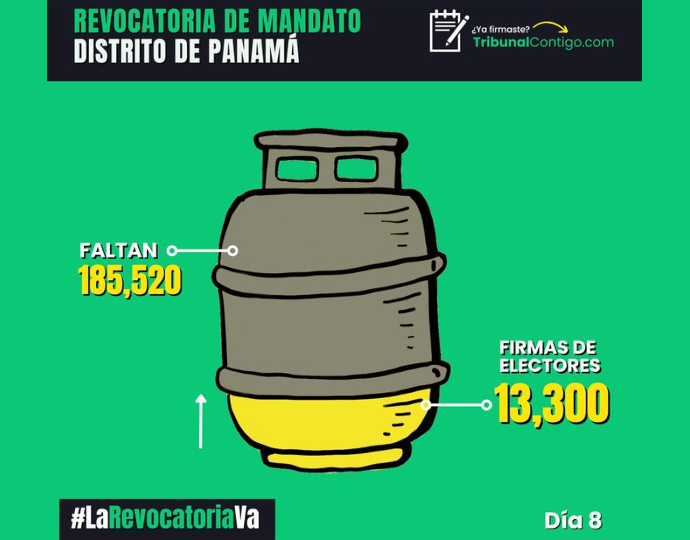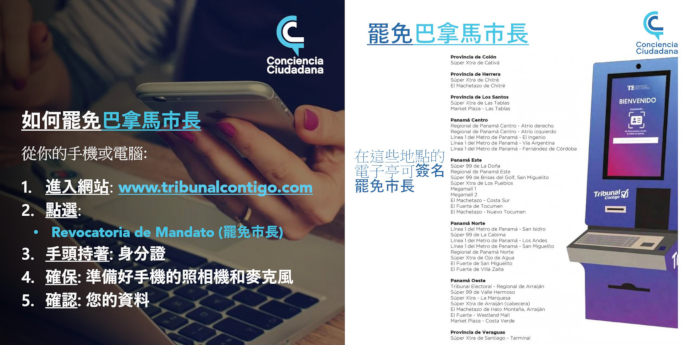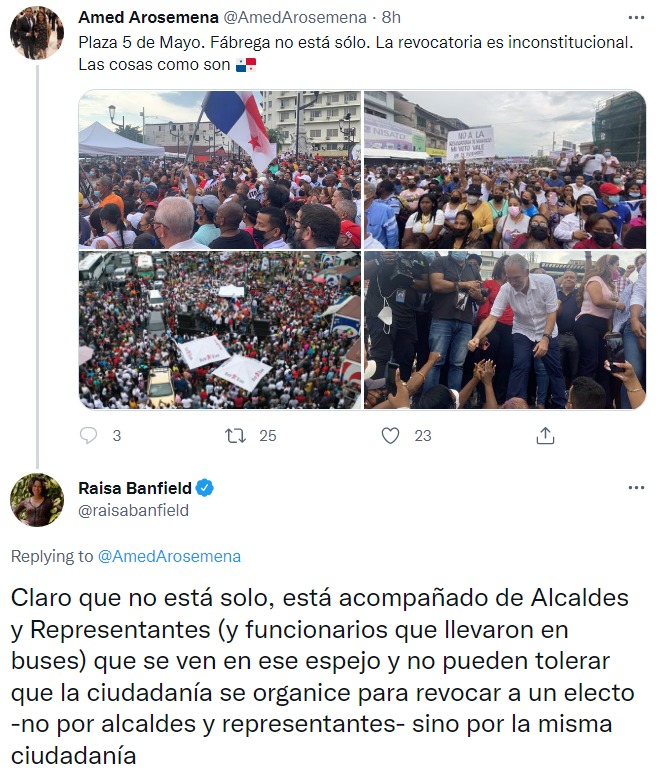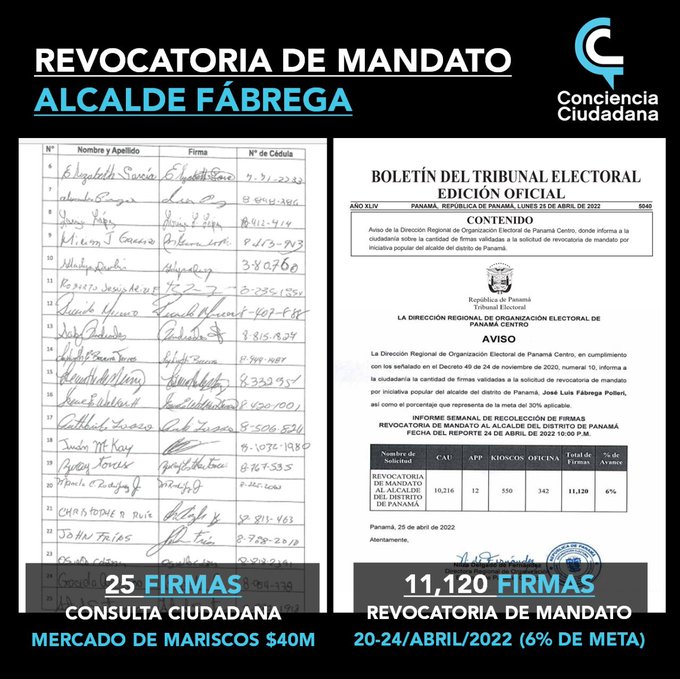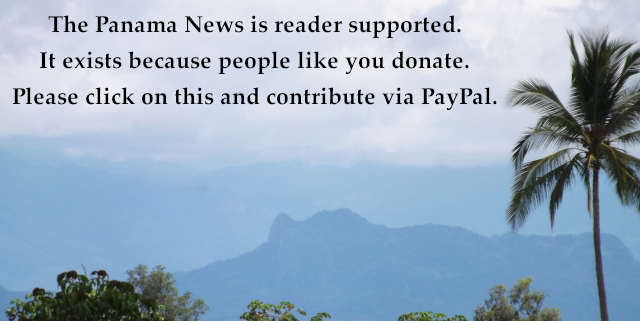The day before, Mayor Fábrega brought in other mayors, representantes and government workers who owe their jobs to political patronage to squeeze perhaps half as many as those who have signed the petition into Plaza Cinco de Mayo. But to get a recall scheduled those who advocate that have a steep hill to climb.
Too early to call this battle unequal
by Eric Jackson
A little more than a week into the petition drive to recall Panama City’s mayor, proponents of that action have garnered fewer than 10 percent of the needed signatures. It’s early yet.
The mayor’s lawyers have not been able to stop the petition drive. On April 26 he did pull an old-fashioned trick, the “show of public support” wherein government workers go to a demonstration that they would be well advised to attend if they care to keep their jobs. THIS demonstration was not just Panama City workers, but mayors, representantes and city employees bussed in from Colon, San Miguelito and the Interior as well. Still, it was a bigger crowd than recall supporters have yet mustered in one place.
The Electoral Tribunal set the rules and structure for signature gathering, which don’t preclude the recall campaign from dragging people out to the signing stations or putting up computer tables wherein people can sign online, but do prevent the “yes” campaign from having a list of supporters to turn out and leads to where to find more, and also keep the “no” campaign from scratching signers off of their canvassing list or maybe signing them up for retaliation. One would expect that by the Tribunal’s rules there would be fewer invalid signatures, but who believes in the magistrates as impartial arbiters anymore? What’s happening is unprecedented, and that means that the traps are little known, perhaps unknowable.
The pro-recall folks are largely working online and going into social nooks and crannies that other campaigns usually don’t — indeed, into places where parts of the PRD known for their intolerance refuse to go. Like making their pitch to naturalized Panamanians of Venezuelan or Colombian origin, and to the Panamanian families of such voters. Groups who are called “scum” in the National Assembly chamber might be ready to hit back at a mayor of the party that insulted them in this fashion. The recall campaign is putting out literature in English, which might be expected to garner support from dual citizens who are culturally more gringo than pana. They’re also campaigning in Chinese:
It’s not the Confucian way to say things against the mayor. But when by all appearances he’s a bad joke, and his party isn’t all that responsive to the needs of the long-established Chinese-Panamanian community, might the Confucian sense of it be that he’s lost heaven’s mandate and ought to lose his more mundane electoral one?
While the recall advocates are trying to go everywhere that they might get a hearing, Mayor Fábrega’s people are going to the political caste in general, with special but not exclusive emphasis on the Democratic Revolutionary Party (PRD). While that party is engaged in some factional warfare ahead of a May convention that will set their leaders through the 2024 election season, the various factions are uniting behind the mayor. If, as entertainer, activist and former government minister Rubén Blades alleges, the PRD is now just a “political patronage party,” think about that, and what it would likely mean if Fábrega is recalled and Vice Mayor Judy Meana steps in. There are thousands of jobs held by PRD activists in the city government, but Meana isn’t PRD, she’s MOLIRENA. The norm in Panamanian culture is that when a new mayor comes in, she or he fires as many of the old people as possible and brings in a new team, loyal to and dependent on the new mayor. It could mean the loss of whole divisions of ward heelers for 2024, and widespread demoralization of the party’s base if the PRD loses many or all of their municipal appointees in a generally bad economy.
Going past the PRD and MOLIRENA, in the legislature there are complicated sets of arrangements by which the political caste in general scratches each others’ backs and avoids partisan aggression that could result in accountability for one and all. The National Assembly judges cases against Supreme Court magistrates and the Supreme Court judges cases against deputies in the assembly, which encourages the most-noticed non-aggression pact in favor of public corruption. But there are other spoils that get divided and shifted among the legislators, with elections altering the divisions of these. At stake are things like bus and taxi permits, control of the nation’s sports federations and often a cut of their funds, plus many jobs and contracts to be steered. The expectation is a five-year spree, which might be renewable by re-election. But what if a recall disrupts such calculations?
In the legislature there is no popular recall. A political party may recall members of its caucus for not following the party line. Right now, the party that Ricardo Martinelli founded and then lost, Cambio Democratico (CD), is controlled by corporate lawyer Rómulo Roux and he and the current party power structure want to remove most of the CD legislative caucus, whose members are more responsive to Martinelli than to Roux. The legislature has passed a law to thwart this process, the president has vetoed it and now the legislature is trying to fashion new wording to work the same result. Why, other than precedent, should the PRD care about what happens to Sergio Gálvez, Yanibel Ábrego et al? Those folks are opposition in a certain sense, but they are part of a consensus that keeps the National Assembly gravy train rolling. With Martinelistas sitting as CD deputies, the PRD might lose some votes over corruption issues but the consensus would still hold. Replace those with deputies loyal to Roux, who is calling for “a real opposition,” and there becomes a much less certain expectation of impunity for whatever a PRD or MOLIRENA deputy might do. The Supreme Court might still block any attempt at imposing consequences through the criminal law, but loss of a consensus within the legislature could mean the elimination of some of the perks of office. Those perks may be of a pecuniary nature for a deputy, but they might also include jobs for his or her entourage. To allow Roux to recall the Martinelista legislators upsets balances that are every bit as threatening to the PRD as is a Fábrega recall.
Thus Martinelistas were at the demonstration against recalling Fábrega, and the PRD caucus has supported the Martinelistas’ efforts to squirm away from Roux’s clutches. There may be partisan interests to advance and defend, but there are also systemic interests that government and opposition legislators will unite to defend. These days the prestige of public institutions is not one of those interests the deputies much want to defend.
A Twitter argument between former Panama City Vice Mayor Raisa Banfield — an architect, environmentalist and political independent — and one of Mayor Fábrega’s supporters. She notes that the political caste in general can’t tolerate any vulnerability to recall by the citizens.
The signature gathering phase of this battle may take four months, and if sufficient signatures are gathered there will be an election campaign to follow. The recall supporters are going to highlight some of the reasons they have for acting as they do — next up is a challenge to the mayor’s plan to build a new seafood market near the present one, without any real consultation or any good reason given. Fábrega is adamant that the project will go on. Expect more such specific confrontations as the campaign unfolds.
We might imagine how the two sides might move if it looks likely that enough signatures will be gathered or if Roux succeeds in purging the legislature of Martinelli loyalists. There are probably too many variables to speculate with much accuracy in either of those cases.
The recall campaign goes after one of the mayor’s pet projects and his alleged aversion to any real public consultation.
Contact us by email at fund4thepanamanews@gmail.com
To fend off hackers, organized trolls and other online vandalism, our website comments feature is switched off. Instead, come to our Facebook page to join in the discussion.
These links are interactive — click on the boxes

